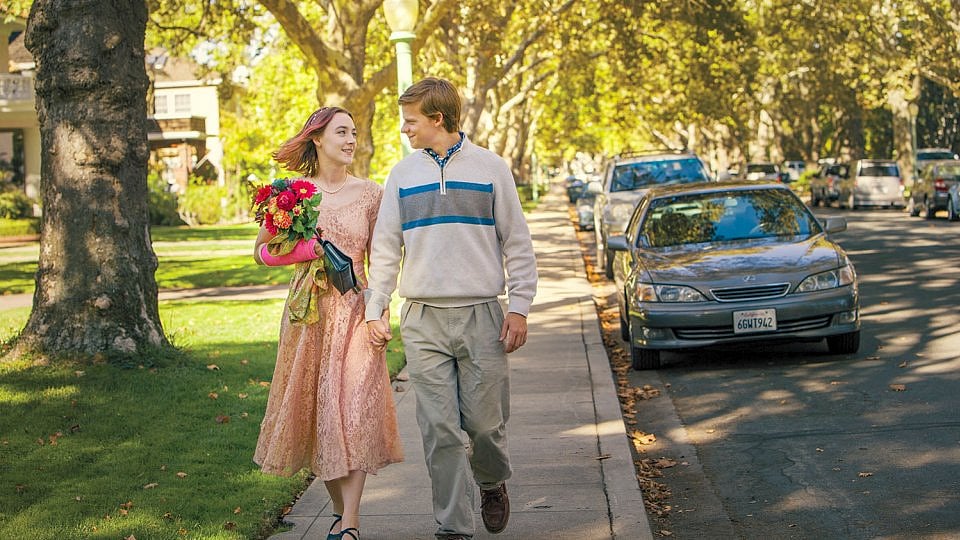‘Lady Bird’ Review: Unconventional & Empathetic Coming-Of-Age Tale
Read about what makes the Oscar frontrunner ‘Lady Bird’ a compelling watch.

advertisement
At an arresting point in Lady Bird, Christine’s mother tells her, “I want you to be the very best version of yourself.” The daughter quickly responds, “But what if this is the best version?”
It’s a question, rather than an answer but the firmness of it as an answer is surprising, and cuts deep.
Lady Bird is full of dialogues that feel as if they were conceived while an improvisation was on. The words are not showy, but they carry a certain knowingness about self that only a lived in character could sprout.
The tough exterior of the film is that of a teenage comedy, filled with the usual props of struggle in school and growing up in America: the apprehension of tests, the madness of school plays, the concerns of higher education, and prom, the glorious of them all. There is also falling in love with one, and crushing on another. The contention with the sibling, the affection and frustration with parents are there too. It might all sound too familiar, but what makes Lady Bird a standout from other teenage comedies is its attention to detail.
Gerwig treats her characters as if she’s revisiting them from memory. There is a convinced fairness in bringing out the absurdity of each character. She knows them too well to ridicule them, and looking back, she coats them with her genteel understanding, strikingly nulling out condescension. In short, if the exterior looks into comic sketches, the interior anchors it with empathy.
By now, we are aware of Christine’s exasperation with her hometown. She hates it here, and can’t wait to move to New York city, or in Connecticut or New Hampshire, where writers live in the woods. Gerwig deftly holds our consideration here, telling us Christine is not hinting at self-flattery, rather the unawareness of what her words and actions really mean, perhaps her older self will have a different version of it while looking back.
The impact of capitalism is not really spelled out, but there’s a sly commentary on how money colours relationships. Christine’s mother works double shifts because her father is jobless, a fact that often incenses the mother while dealing with her ungrateful offspring. Christine dumps her best friend Julie (Beanie Feldstein) to get close to the school’s queen bee Jenna (Odeya Rush) who is so wealthy that Christine has to pretend to be uber rich.
Christine’s first boyfriend Danny (Lucas Hedges of Manchester By The Sea) invites her to the Thanksgiving feast to his grandmother’s house which Christine always called her dream house. Her crush Kyle (Timothée Chalamet of Call Me By Your Name) is “trying as much as possible not to participate in our economy” though he is deeply ensconced in the luxury of a well-heeled lifestyle.
Marion says the most vicious things a mother can possibly tell her daughter in a civilised society, constantly admonishing her for being self-centred. The fights and exchanged words are heartbreaking, but they also reveal the harsh truth of parents realising how their offspring has grown up, ready to leave the nest. Gerwig leads us to this heart-rending truth without manipulation, because along the way she also tells us how beautiful the mother-daughter bond can be, regardless of the number of fights they have had.
When they discover the perfect dress at a shop, lighting up like two best friends attuned to each other’s tastes, you know a river of warmth is flowing beneath this resentment. TV veteran Laurie Metcalf plays Marion with a layered precision that veers towards acting masterclass, making the worries and insecurities of a mother gently tactile. Marion might not be ready for the final goodbye, but when she drives away from her daughter at the airport, you cry along with her.
The quality that makes Lady Bird a marvel in the world of teen protagonists is that it refuses to make her a cliché of troubled youth that we are so used to watching on screen. She is hardly a special case of reckless rebel, or an awkward misfit, but a common, average adolescent who wants to be her own self, despite anxieties lurking everywhere. For long, we’ve had boys growing up. This time, a girl comes of age, and the specificity of this typical teen is what makes her so special.
(The writer is a journalist, a screenwriter, and a content developer who believes in the insanity of words, in print or otherwise. He tweets @RanjibMazumder)